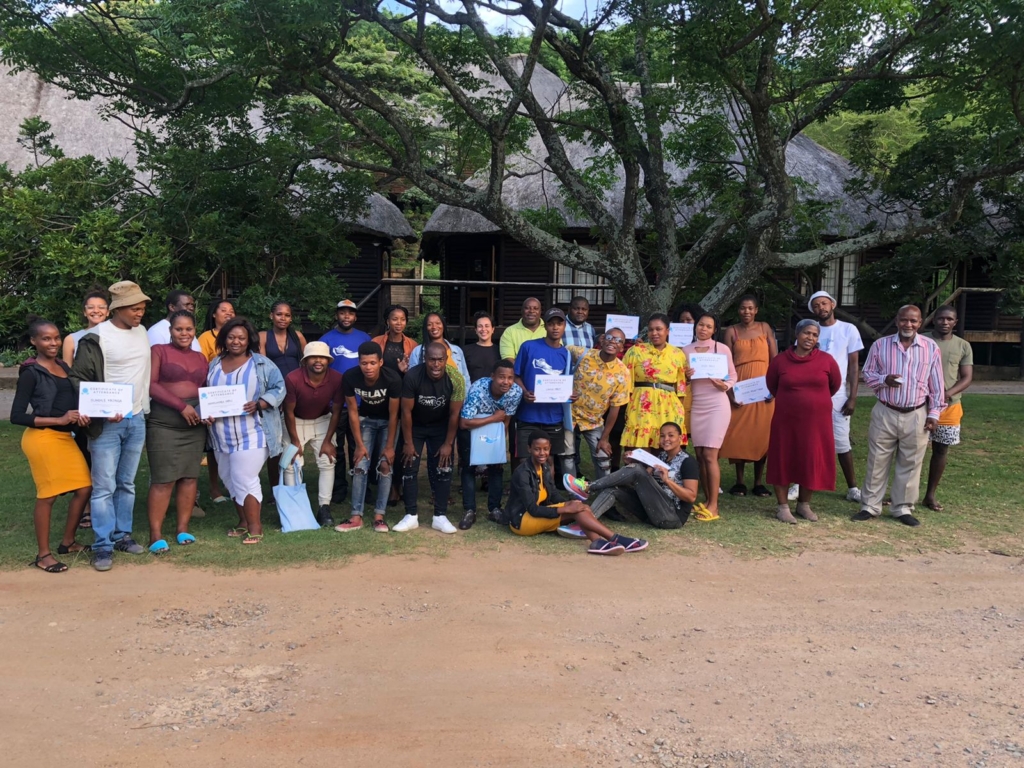December 1, 2021
On 15 November 2021 Masifundise hosted their very first SSF youth activist school in Durban, South Africa. The school was attended by 30 youth from the coastal communities of KwaZulu-Natal and the Eastern Cape as well Coastal Links veteran leadership. Throughout the week, participants explored various small-scale fishing challenges facing in their communities such as non-functioning cooperatives, restrictions imposed by Marine Protected Areas (MPA), mining and the privatization of markets. This summer school, which is anchored in the “Ensuring the social-economic rights and decent work conditions for South Africa small-scale fishers” (SERP) project, that was implemented in partnership with Crocevia, Transnational Institute (TNI) FIAN International. A key strategic goal for Masifundise was to empower youth of coastal small-scale fishing communities, especially youth and women, across South Africa with the relevant knowledge and capacity to claim, defend, and promote Food Sovereignty in small-scale fishing communities. “The idea behind this summer school was to build relationships with the youth in fishing communities and create a sense of camaraderie and solidarity amongst them. As Masifundise we wanted to empower participants to make sense of current developments happening in the ocean space and understand who the actors are and powers at play. We wanted to support youth to see an alternative for their communities and to strengthen their political leadership skills to mobilise and organise in their respective communities”, explained Carmen Mannarino, Programme Manager at Masifundise.  Each session was structured to allow maximum participation, encouraging engagement through group work, role playing, reading exercises, personal reflection and other useful popular educational tools. Participants learnt how to develop strategies to engage governance institutions and develop analytical tools and conceptual frameworks, using the SSF Guidelines as a tool to articulate an alternative paradigm for sustainable development, in line with Human rights-based approaches. Part of strengthening their political leadership skills to mobilize and organize was our session on what tools can be used to fight back against the challenges youth face in the SSF sector. For the session, participants took part in a role-playing exercise around Political Mobilization. They were separated into two groups and were given hypothetical scenario around potential Blue Economy threats that have and could infiltrate their communities. This exercise highlighted the different ways and means communities could challenge ongoing threats as well as the different tools they have in their arsenal to fight against them. The tools included the South Africa Constitution, the National Small Scale Fisheries Policy and the international Small-scale Fisheries Guidelines. The Coastal Links veterans played an important role of imparting historical knowledge and outlining the struggle for fishing rights and the recognition of small-scale fisheries a sector. These leaders also provided guidance to the younger generation on how to mobilize and fight for their rights as small-scale fishers. “We are very excited to have hosted a successful youth summer school. We had a great youth cohort who engaged actively and had a deep thirst to learn. We hope to continue with these schools in order to motivate the youth to become active leaders and agents of change in their communities said,” Sibongiseni Gwebani from Masifundise.
Each session was structured to allow maximum participation, encouraging engagement through group work, role playing, reading exercises, personal reflection and other useful popular educational tools. Participants learnt how to develop strategies to engage governance institutions and develop analytical tools and conceptual frameworks, using the SSF Guidelines as a tool to articulate an alternative paradigm for sustainable development, in line with Human rights-based approaches. Part of strengthening their political leadership skills to mobilize and organize was our session on what tools can be used to fight back against the challenges youth face in the SSF sector. For the session, participants took part in a role-playing exercise around Political Mobilization. They were separated into two groups and were given hypothetical scenario around potential Blue Economy threats that have and could infiltrate their communities. This exercise highlighted the different ways and means communities could challenge ongoing threats as well as the different tools they have in their arsenal to fight against them. The tools included the South Africa Constitution, the National Small Scale Fisheries Policy and the international Small-scale Fisheries Guidelines. The Coastal Links veterans played an important role of imparting historical knowledge and outlining the struggle for fishing rights and the recognition of small-scale fisheries a sector. These leaders also provided guidance to the younger generation on how to mobilize and fight for their rights as small-scale fishers. “We are very excited to have hosted a successful youth summer school. We had a great youth cohort who engaged actively and had a deep thirst to learn. We hope to continue with these schools in order to motivate the youth to become active leaders and agents of change in their communities said,” Sibongiseni Gwebani from Masifundise.
